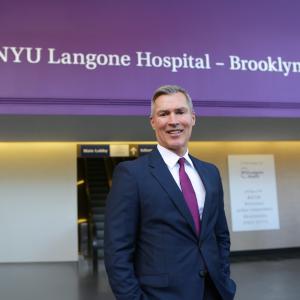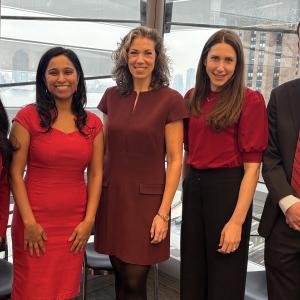
Ian Wittman, MD, chief of service for the Emergency Department at NYU Langone Hospital—Brooklyn, and his team use Voyce interpretation sessions more than any other clinical unit in the hospital.
Credit: Tony Luong
One day last fall, a young pregnant woman arrived in the Emergency Department (ED) at NYU Langone Hospital—Brooklyn in great physical distress. She was alone and spoke a dialect no clinician understood. Two of the hospital’s administrators—Vjollca Latifi, supervisor of Volunteer, Language, Cultural, and Disability Services, and Maricruz Criollo, director of Patient Relations, Cultural Competence, Volunteers, and Language Services—enlisted the help of a Spanish interpreter on staff, who determined that the woman spoke K’iche’, a Mayan language indigenous to the central highlands of Guatemala. Armed with that information, Criollo was able to reach an interpreter outside the hospital who was fluent in K’iche’. The interpreter helped the woman describe her pain. She was quickly transferred to labor and delivery, where she gave birth to a healthy baby. “To be able to provide translation services to a patient in urgent need, as she was, is very rewarding,” says Criollo.
The tool that facilitated that critical dialogue, and thousands more cases like it, debuted at NYU Langone Hospital—Brooklyn only weeks earlier, on July 24, 2023. Voyce, a secure video-and-audio remote interpretation service, enables communication in more than 240 languages, including American Sign Language and various indigenous dialects, often in 20 seconds or less. Voyce connects patients, their families, and clinicians with a live interpreter. The service’s speed, efficiency, and accuracy reassure patients and their families while providing essential real-time information to clinicians, enhancing safety and leading to better outcomes.
“In the ED, seconds count,” notes Ian Wittman, MD, a clinical associate professor in the Ronald O. Perelman Department of Emergency Medicine at NYU Grossman School of Medicine and chief of service for the hospital’s ED. “Improving the speed and quality of our interpretation ensures that all patients receive the same excellent and expeditious care.” In February 2024, 41 percent of the hospital’s 12,252 Voyce sessions were initiated by clinicians in the ED.
Perhaps none of NYU Langone Health’s hospitals has had greater need for a robust interpretation service than NYU Langone Hospital—Brooklyn, whose patient population is “as multicultural as the United Nations,” notes Criollo. The surrounding neighborhood of Sunset Park is among the most diverse in New York City, with more than three in four residents best served in a language other than English.
Voyce was implemented across our entire enterprise, including outpatient sites, by NYU Langone’s Medical Center Information Technology (MCIT) Department in November 2023. The system is now used in 84 percent of engagements with patients who have limited proficiency in English. In the remaining 16 percent of cases, translation is done in person through staff interpreters or staff members; more than 2,400 employees are certified by our Bilingual Competency Program.
NYU Langone’s goal is to ensure that patients with limited proficiency in English have access to interpretation services throughout their stay. They can choose the gender of their Voyce interpreter, and a session that is audio only or audio with video. The app is available on most devices with access to Epic, NYU Langone’s electronic medical record system, including computers, tablets, smartphones, and MyWall, a digital hub for inpatients. A record of each interpretation session is automatically documented on Epic, though for privacy reasons the content is not recorded.
Anatoly Feldman, a director on the Enterprise Clinical Ancillary System team in MCIT, says the technology’s deep integration with Epic makes it easy for clinicians to use. “Voyce launches from Epic with one click of a button,” he explains. “For registered patients, there’s no need to provide patient information and request a language, because Voyce interpretation requests are automatically routed to an appropriate interpreter based on the patient’s preferred language.”
Bret J. Rudy, MD, executive vice president and chief of hospital operations at NYU Langone Hospital—Brooklyn, says Voyce allows the hospital to better serve the community, ensuring optimal care for every patient who enters its doors. “I can think of no better way to welcome patients into our institution,” he notes, “than by showing them the respect of communicating effectively with them.”

